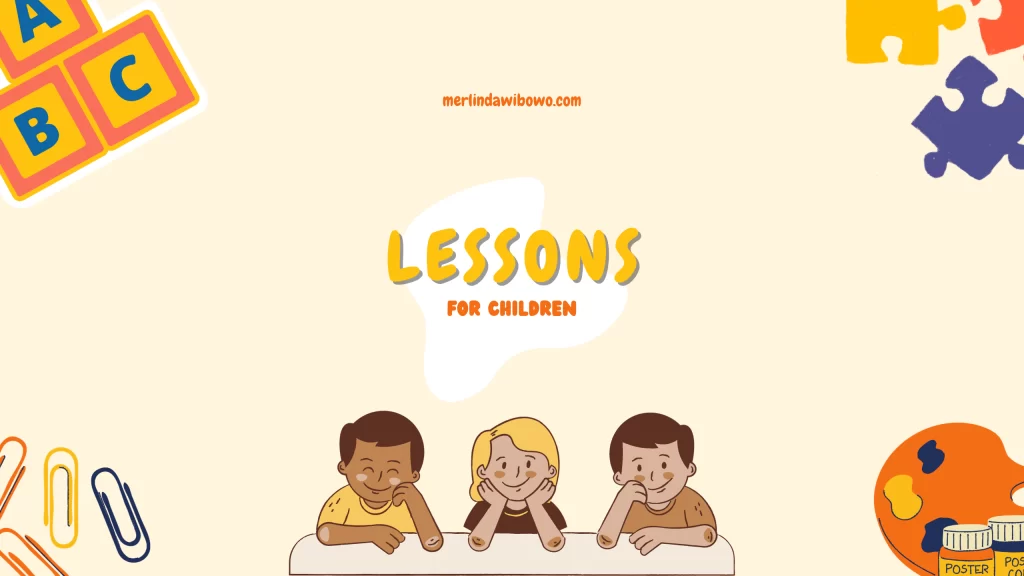[Lessons for children] When are formal lessons or structured learning activities for children?
Daftar Isi
merlindawibowo.com – “Lessons for children” typically refer to educational activities, instructions, or experiences designed to teach and impart children knowledge, skills, and values. These lessons can cover a wide range of subjects and topics, and they are structured to be age-appropriate and engaging for children’s developmental stages and interests. Lessons for children can include:

- Academic Lessons: These focus on reading, mathematics, science, history, and geography, tailored to a child’s age and grade level.
- Life Skills Lessons: These teach practical skills such as cooking, cleaning, personal hygiene, time management, and money management.
- Art and Creative Lessons: These encourage artistic expression through drawing, painting, crafting, music, dance, and creative writing.
- Physical Education Lessons involve physical activities, sports, and exercises to promote physical health and well-being.
- Social and Emotional Learning Lessons: These aim to develop children’s social skills, emotional intelligence, and empathy, helping them understand and manage their emotions and build healthy relationships.
- Cultural and Diversity Lessons: These teach children about different cultures traditions, and the importance of tolerance and diversity.
- Character Education Lessons: These emphasize honesty, respect, responsibility, kindness, and citizenship.
- Technology and Coding Lessons introduce children to basic computer skills, programming, and technology concepts.
- Foreign Language Lessons: These introduce children to new languages and cultures, often through vocabulary, phrases, and cultural activities.
- STEM (Science, Technology, Engineering, and Mathematics) Lessons provide hands-on learning experiences in robotics, engineering, and scientific experimentation.
- Critical Thinking and Problem-Solving Lessons help children develop cognitive skills, analytical thinking, and creativity.
- Religious or Moral Lessons: Sometimes, lessons may include religious or moral teachings based on the family’s values and beliefs.
Lessons for children can be delivered in various formats, including formal classroom settings, homeschooling environments, online courses, extracurricular activities, and hands-on experiences. The goal is to provide children with a well-rounded education and the skills and knowledge they need to grow, thrive, and become responsible members of society.
Here are some key reasons why we need lessons for children:
- Education and Knowledge Acquisition: Lessons provide structured opportunities for children to acquire knowledge and learn new skills. They introduce children to essential subjects such as reading, math, science, and more. Education is the foundation for personal growth and future success.
- Language Development: Language is a fundamental skill, and lessons help children develop strong language skills, including vocabulary, grammar, and communication. Effective communication is essential for success in school and life.
- Social and Emotional Development: Lessons teach children social skills such as teamwork, cooperation, and empathy. They also help children understand and manage their emotions, fostering emotional intelligence.
- Cognitive Development: Lessons stimulate cognitive development by challenging children to think critically, solve problems, and make connections between concepts. These activities help develop reasoning, memory, and analytical skills.
- Life Skills: Lessons in practical skills like cooking, budgeting, and time management prepare children for independent living and adulthood. These skills are vital for self-sufficiency.
- Character Development: Lessons on values and ethics instill principles like honesty, integrity, responsibility, and kindness, which contribute to the development of strong character.
- Technology and Digital Literacy: In the digital age, lessons in technology and digital literacy are crucial for children to navigate the modern world effectively and safely.
- Safety and Well-being: Lessons on safety, health, and personal well-being help children make informed decisions that protect their physical and emotional health.
Lessons for children are essential for their holistic development, helping them grow intellectually, emotionally, socially, and physically. These lessons provide the tools and knowledge necessary for children to thrive and become responsible, well-rounded individuals in society.
Read : “Smart Children” What is the characteristic common to?
Timing to start formal lessons for children
The timing for when to start formal lessons for children can vary depending on individual factors, cultural norms, and educational philosophies. Here are some general guidelines for when formal lessons or structured learning activities can begin for children:
- Infancy to Toddlerhood (0-2 Years):
- Children primarily learn through sensory exploration, caregiver interaction, and play during this stage.
- Informal activities like talking to the baby, reading books, singing songs, and exposing them to various stimuli are essential for early brain development.
- Formal lessons or structured activities are not typically necessary at this stage.
- Preschool (3-5 Years):
- Preschool programs or activities can be introduced around the age of 3.
- Through play-based learning, preschool often focuses on socialization, basic language skills, early math concepts, and fine motor skills.
- Lessons are typically short, age-appropriate, and designed to foster a love for learning rather than rigorous academic achievement.
- Kindergarten (5-6 Years):
- Formal schooling usually begins with kindergarten, which serves as an introduction to structured learning.
- Kindergarten focuses on building foundational reading, writing, math, and socialization skills.
- Lessons are typically more structured and academic than preschool but emphasize play and exploration.
- Early Elementary (6-8 Years):
- In the early elementary years, formal lessons become more structured and academic.
- Subjects like math, reading, writing, science, and social studies are introduced and taught more systematically.
- Homework may be assigned, and standardized testing may begin in some educational systems.
- Late Elementary (9-11 Years):
- Lessons continue to become more rigorous and structured as children progress through late elementary grades.
- Subjects become more specialized, and students may engage in extracurricular activities or lessons in areas of interest.
- Middle and High School (12+ Years):
- Middle and high school education involves a more advanced and comprehensive curriculum focusing on preparing for higher education or future careers.
- Students may have a broader range of subjects and engage in more intensive lessons.
In summary, lessons for children are essential for their holistic development, helping them grow intellectually, emotionally, socially, and physically. Some children may benefit from early exposure to structured learning, while others may thrive with a later start. The key is to tailor the approach to the child’s developmental needs and interests.


